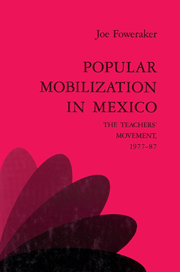Book contents
- Frontmatter
- Contents
- Preface
- Glossary of acronyms
- Introduction: The character and context of popular mobilization in contemporary Mexico
- PART I POPULAR MOVEMENT AND SYNDICAL STRUGGLE
- PART II INSIDE THE MOVEMENT IN CHIAPAS
- PART III NATIONAL MOBILIZATION AND SYSTEM RESPONSES
- 7 Regional movements
- 8 Institutional controls
- 9 Popular strategies
- PART IV POPULAR MOVEMENTS AND POLITICAL CHANGE
- Bibliography
- Index
8 - Institutional controls
Published online by Cambridge University Press: 29 September 2009
- Frontmatter
- Contents
- Preface
- Glossary of acronyms
- Introduction: The character and context of popular mobilization in contemporary Mexico
- PART I POPULAR MOVEMENT AND SYNDICAL STRUGGLE
- PART II INSIDE THE MOVEMENT IN CHIAPAS
- PART III NATIONAL MOBILIZATION AND SYSTEM RESPONSES
- 7 Regional movements
- 8 Institutional controls
- 9 Popular strategies
- PART IV POPULAR MOVEMENTS AND POLITICAL CHANGE
- Bibliography
- Index
Summary
The teachers' movement did not develop in a political vacuum. Rather, it advanced across the institutional terrain linking political actors in civil society with government agencies. Its trajectory was therefore conditioned not only by the changing internal composition of the movement (see Chapters 5 and 6) but also by recurrent shifts in the institutional context of the struggle, which might prevent or promote the movement's organization and demands. These shifts often reflected changing relations between government agencies themselves as they responded to new strategic priorities or, indeed, to the political pressure of popular mobilization (see Chapter 9); and such changes in “internal State organization” (Jessop 1982) were less legal or constitutional than purely political outcomes of a complex process of confrontation and negotiation. Most relevant to the teachers' movement and its strategic opportunities was the relationship between the National Union of Workers in Education (SNTE) and the Ministry of Education, particularly the political strains induced by the latter's program of educational decentralization.
The SNTE occupies a central place in Mexico's political system (see Chapter 3). Traditionally, the intimate connections between the federal government and the union have been cemented by both bureaucratic and political mechanisms. The ruling party has recruited union leaders into the middle ranges of the federal bureaucracy, thus ensuring union influence over the regional administration of the Ministry of Education; and the union has also achieved a political presence in the federal congress and in a large number of state and municipal governments across the country. At the same time, the union bridges the corporative and electoral arenas of the system (see Introduction) and has direct contact with teachers in every community in Mexico (see Chapter 1).
- Type
- Chapter
- Information
- Popular Mobilization in MexicoThe Teachers' Movement 1977–87, pp. 117 - 129Publisher: Cambridge University PressPrint publication year: 1993



